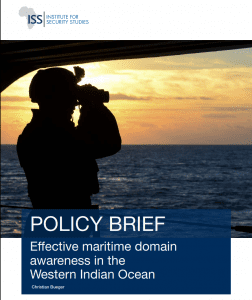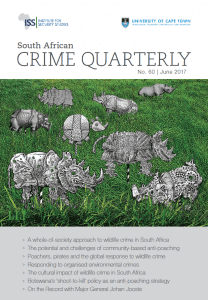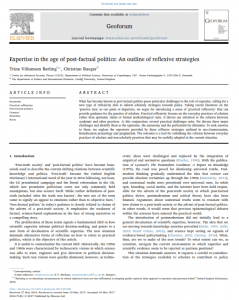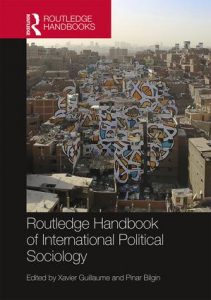What are the challenges in governing maritime security? How can the capacity gap closed through capacity building projects? What guidelines can make such work more effective? These are the questions that I address in a new short article published in the Seychelles Research Journal. I discuss the key insight developed in our last research project which were published as a best practice tool kit titled “Mastering Maritime Security”.
Category Archives: Publications
Edited volume on Conflict Resolution Expertise published
Thinking the blue economy as kaleidoscope: Review published
My short review of James Alix Michel’s Rethinking The Oceans – Towards the Blue Economy is available as online first with the Journal of the Indian Ocean Region. In the review, I highlight the productivity of interpreting blue economy as a kaleidoscope, rather than striving for a universal definition. I then argue for the importance of paying more attention to the link between blue economy and maritime security. Free pre-print copies of the review are available here.
Policy brief on maritime domain awareness
 How can maritime domain awareness (MDA) in the Western Indian Ocean be improved? This is the question I address in a new Policy Brief published by the Institute for Security Studies Pretoria. Much of the current MDA work is in the hands of international actors, and although significant capacity building is underway, projects such as the Djibouti Code of Conduct or the MASE project have not led to a functioning MDA structure. I argue that a focus on people and improved coordination would allow to step up the game.
How can maritime domain awareness (MDA) in the Western Indian Ocean be improved? This is the question I address in a new Policy Brief published by the Institute for Security Studies Pretoria. Much of the current MDA work is in the hands of international actors, and although significant capacity building is underway, projects such as the Djibouti Code of Conduct or the MASE project have not led to a functioning MDA structure. I argue that a focus on people and improved coordination would allow to step up the game.
Pirates and Poachers. New article on environmental crime published
 In a recently published article together with Olga Biegus, we are investigating how the global response to wildlife crime can be improved drawing on the lessons from counter-piracy off the coast of Somalia. The article is published in the South African Crime Quarterly. Here is the abstract:
In a recently published article together with Olga Biegus, we are investigating how the global response to wildlife crime can be improved drawing on the lessons from counter-piracy off the coast of Somalia. The article is published in the South African Crime Quarterly. Here is the abstract:
This article aims at identifying how the global response to poaching can be improved and what role South Africa might play in it. To do so, we examine the emerging global wildlife crime regime and the challenges it faces. To offer an understanding of how governance could be improved, we ask how the success in curbing another transnational crime can serve as an example of international coordination. Through a comparison, we aim at identifying core dimensions by which the coordination of counter-poaching can be improved. Our conclusion stresses the importance of a more focused, inclusive and experimental account. We end in outlining a number of core issues that South Africa should start to consider in its policies towards wildlife crime.
Expertise in the Age of Post-Factual Politics: New Article published
 In a newly published article titled “Expertise in the Age of Post-Factual Politics: An outline of reflexive strategies”, we discuss how we as academics might respond to the conditions of post-factual politics. In the article, co-authored with Trine Villumsen Berling and published in Geoforum, we argue that practical reflexivity allows for developing strategies. We draw on a range of social theorists (Gramsci, Bourdieu, Dewey, Rorty) that offer three outlines of practical reflexivity: The organic, collective and ironic strategy. Access the article here, or contact me by email if you want a copy.
In a newly published article titled “Expertise in the Age of Post-Factual Politics: An outline of reflexive strategies”, we discuss how we as academics might respond to the conditions of post-factual politics. In the article, co-authored with Trine Villumsen Berling and published in Geoforum, we argue that practical reflexivity allows for developing strategies. We draw on a range of social theorists (Gramsci, Bourdieu, Dewey, Rorty) that offer three outlines of practical reflexivity: The organic, collective and ironic strategy. Access the article here, or contact me by email if you want a copy.
Symposium on Practice Theory, Relationalism and Constructivism published
In a Symposium of International Studies Quarterly Online we discuss in what way constructivist International Relations theorizing is advanced or challenged by the rise of international practice theories and relationalism. The starting point is a theory note by David McCourt, who argued that practice theories and relationalism are the new IR constructivisms. In my response to that claim, I argue that practice theories have their own conceptual and methodological approaches and it hence doesn’t make any sense to subsume them under constructivism. Other contributors include Ted Hopf, Oliver Kessler, Stacie Goddard, Alex Montgomery, Cecelia Lynch, Ty Solomon and Swati Srivastava.
New Comment on the Return of Piracy
In a new op-ed published by The Conversation written with Robert McCabe, we discuss whether the recent hijacking of the ARIS 13 off the coast of Somalia implies a return of piracy. We argue that the incident should be understood as a warning signal and should remind us about the importance of taking the grievances of coastal communities seriously. It is available here.
Handbook on International Political Sociology published
 The Handbook of International Political Sociology edited by Xavier Guillaume and Pinar Bilgin has been published. The handbook provides a survey through the multi-dimensional field of international political sociology, explores core issues, theories and methods as well as the connections to cognate disciplines. It will become a useful resource for students and scholars and further strengthen the field. In my own chapter I discuss the practice turn and its methodological implications. Preview the book here.
The Handbook of International Political Sociology edited by Xavier Guillaume and Pinar Bilgin has been published. The handbook provides a survey through the multi-dimensional field of international political sociology, explores core issues, theories and methods as well as the connections to cognate disciplines. It will become a useful resource for students and scholars and further strengthen the field. In my own chapter I discuss the practice turn and its methodological implications. Preview the book here.
New edition of Handbook of Security Studies published
 The 2nd edition of the Routledge Handbook of Security Studies has just been published. The 41 chapters give an overview of the stat of the art of Security Studies, discuss theoretical approaches, as well as distinct security challenges. In my contribution to the handbook, titled “Security as Practice”, I introduce and discuss how practice theories have been developed within the sub-discipline. I pay particular attention to theories developed from Bourdieu’s work, the security communities of practice approach, as well as relationalist and actor-network theory inspired work. The pre-print of the chapter is available via my academia page.
The 2nd edition of the Routledge Handbook of Security Studies has just been published. The 41 chapters give an overview of the stat of the art of Security Studies, discuss theoretical approaches, as well as distinct security challenges. In my contribution to the handbook, titled “Security as Practice”, I introduce and discuss how practice theories have been developed within the sub-discipline. I pay particular attention to theories developed from Bourdieu’s work, the security communities of practice approach, as well as relationalist and actor-network theory inspired work. The pre-print of the chapter is available via my academia page.